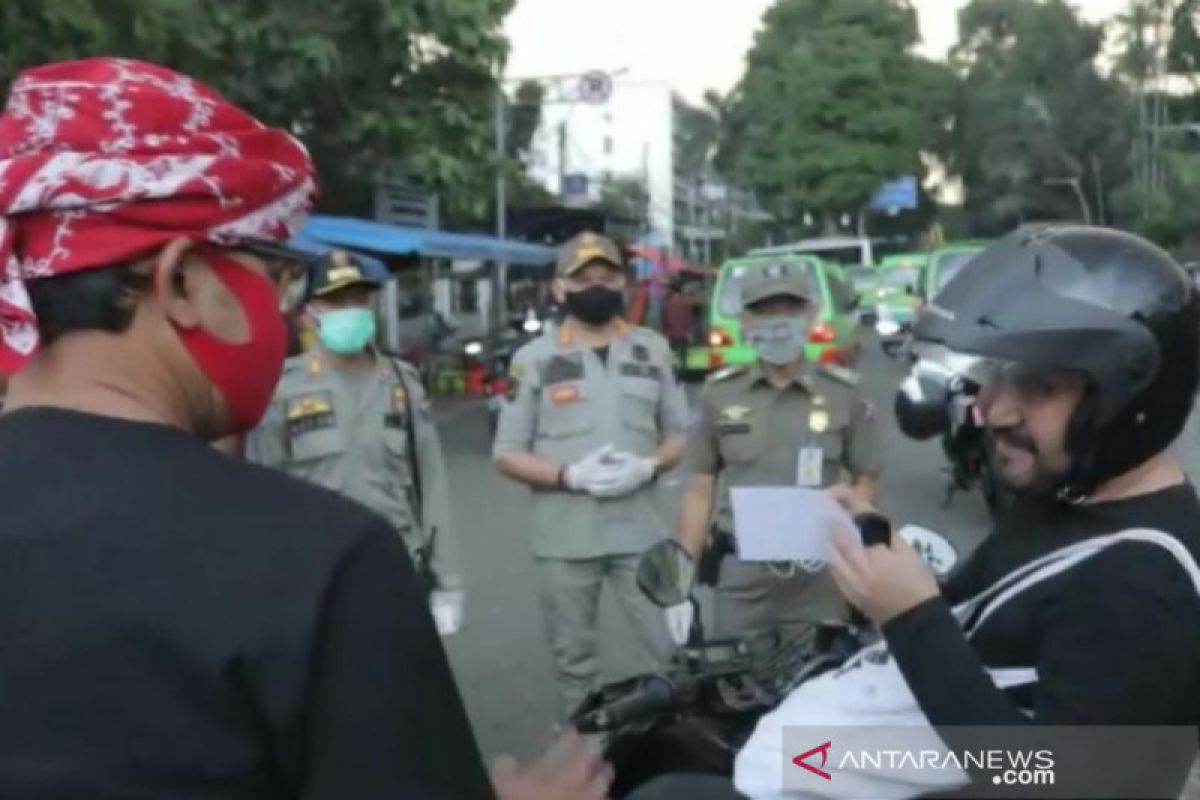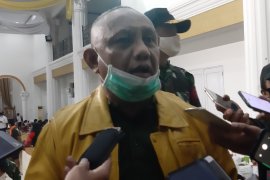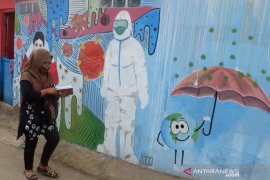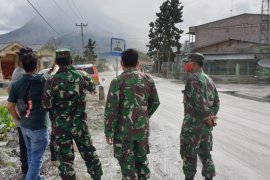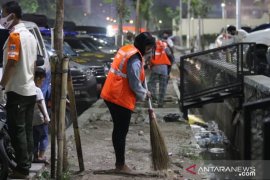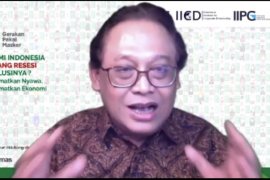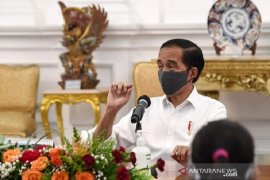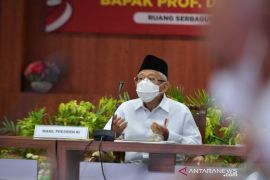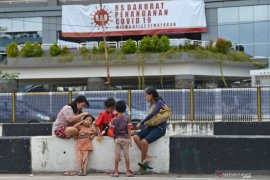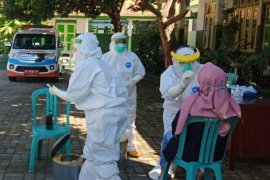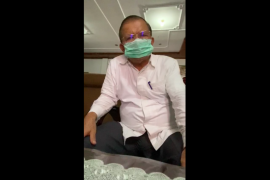Studies have shown that face masks can reduce coronavirus transmission by around 50-85 percent.
In addition, social and physical distancing, as well as frequent hand washing with soap and running water are also necessary for preventing COVID-19 transmission.
The COVID-19 death rate in Indonesia is quite high, and even among the highest in the region. As of August 15, 2020, the nation's total case tally stood at 137,468, the death toll at 6,071, and the number of recoveries was at 91,321.
One of the reasons for this is that public adherence to the health protocols laid down by the government is still less than 50 per cent.
Surveys have shown that about 95 percent of respondents understand the importance of following health protocols, but the level of compliance remains below 50 percent, according to Doni Monardo, head of the Task Force for COVID-19 Handling.
Therefore, President Joko Widodo (Jokowi) has called for the launch of a two-week, nationwide "wear face mask" campaign to curtail the spread of COVID-19.
The President has also advised a stage-wise implementation of a behavioral change campaign, starting with the"wear face mask" campaign.
"Later, after two weeks, the campaign (focus) should be on social distancing or hand washing, for instance. Do not club together matters on hand washing, social distancing, crowd prevention, or mask wearing," he explained.
Jokowi is keen that the people give serious attention to health protocols and amend their behavior accordingly.
Moreover, the head of state is looking to involve members of the Family Welfare Movement (PKK) to help conduct a door-to-door campaign on wearing of masks.
The President said he is optimistic that the campaign, which will be conducted on a mass scale with the help of television and social media, would help change public behavior.
Jokowi has also issued new instructions under which sanctions will be imposed on individuals, businesses, and providers of public facilities and services found flouting the health protocols.
Under the new rules, the obligation to comply with the health protocols will lie with individuals, businesses, managers, organizers, or those responsible for public places and facilities.
The Presidential instruction (Inpres) No. 6 of 2020 signed on Aug 4, 2020, also regulates dissemination of information or educational material on prevention and control of COVID-19 by involving the community, religious leaders, traditional leaders, community leaders, and other elements of society.
Disciplinary enforcement of the health protocols has been further laid down in the regulations of governors, district heads, or mayors. According to the Inpres, in drafting regional regulations, administrations must pay attention and adjust to the local wisdom of each region.
The Head of State has highlighted the significance of public discipline in applying health protocols to stop the transmission of the novel coronavirus (SARS-CoV-2).
He cited a survey in East Java that indicated 70 percent of the province's residents did not wear masks during outdoor activities, thereby demonstrating low public participation in endeavors to cut the chain of COVID-19 transmission.
Echoing the President's views, Pandu Riono, an epidemiologist at the University of Indonesia (UI), said he believes the spread of coronavirus infections can be effectively controlled through human discipline and willingness to wear face masks.
"I think that method will work if we also invite the public to supervise if there is any non-compliance. Those not accustomed to wearing masks will later get habituated to wearing them," Riono remarked while addressing a Wear Mask Movement webinar themed ‘Indonesian economy on the verge of recession. What's the Solution?’ recently.
Riono highlighted the need to get accustomed to the habit of wearing masks in the wake of the long-term impact of the pandemic that may extend for two to three years.
He said he believes that vaccines are not the only solution.
"This is because even if (a vaccine) is developed, the production would take time and effort. Just imagine how many will have to be produced for all the Indonesian population. Hence, do not rely only on vaccines. Use what is available as of now, which are face masks," he advised.
Riono pointed out that oftentimes asymptomatic people transmit the virus and cited the example of office clusters or dormitories, wherein one asymptomatic person can transmit COVID-19 to a thousand others.
"Hence, do not underestimate the severity of the virus," he stressed.
To thwart the spread of COVID-19, one should wear a face mask, he said. This is especially important since a large-sized respiratory droplet can directly fall to the ground, but the small ones first remain afloat in the air, particularly in a poorly ventilated room, thereby resulting in a high transmission rate, he explained.
“Hence, the only choice is that we must wear masks. (The public campaign to wear masks) must propagate a great message, notably that masks protect you and me,” he reiterated.
He lauded the government's plan to conduct an extensive campaign to wear masks.
“Please focus on handling the pandemic first, so that the economy can be restored,” he added.
Chairperson of the Movement to Wear Masks (GPM), Sigit Pramono, opined that the campaign's message should be simple so it is easily understood by the public.
Pramono advised against the use of "new normal" words.
"Right from the president to whoever he or she (the campaign proponents) would be should spread the message that wearing a mask protects you and me," Pramono stated.
GPM will launch a movement to promote wearing of masks for women community groups on August 17, and at the end of the same month, another drive will be launched for the younger generation.
The public campaign on wearing face masks involves several stakeholders, including military and police officers.
"Hence, the police, in their law enforcement efforts, apply the principle of ultimum remedium. Hence, law enforcement is the last resort. To this end, we continue to prioritize preemptive and preventive measures," Brigadier General Awi Setiyono, the National Polices spokesperson, stated recently.
To implement Presidential Instruction (Inpres) Number 6 of 2020 on increased discipline and law enforcement of health protocols for the prevention and control of COVID-19, the police will reprimand offenders verbally and in writing.
The police will also edify the public on applying health protocols,
In the meantime, Erick Thohir, executive chairman of the Policy Committee for COVID-19 Handling and National Economic Recovery, has reiterated that the Sinovac-Bio Farma COVID-19 vaccine may be ready for distribution by early 2021, thereby necessitating continued public adherence to health protocols.
Thohir, concurrently the state-owned enterprises minister, has highlighted the criticality of continuing to wear masks, maintaining requisite safe distancing, washing hands, and applying other guidelines outlined in the health protocols.
The minister opined that there is still time before people can revert to the lifestyle they followed in the pre-pandemic period, as Indonesia is still battling the COVID-19 pandemic.
One of the keys to successful handling of the COVID-19 pandemic is public compliance with health protocols, he said.
"The people should also not conjecture that there is a positive atmosphere at the moment, whether be it with regard to the vaccine or the rising rate of recovery. It does not mean that we go back to leading normal daily lives as we did before," he stated.
The Health Ministry on August 13, 2020, cited the latest survey conducted by the Central Statistics Agency (BPS), that said 80 percent of Indonesians are wearing masks, but the remaining 20 percent are yet to take up the practice.
Hence, 20 percent of the population is at risk of contracting the SARS-CoV-2 virus, according to Director of Health Promotion and Community Empowerment at the Ministry of Health, Riskiyana Sukandhi Putra.
He drew attention to the importance of proper use of face masks, right from selecting the type of masks to the right way to wear them, remove them, and properly dispose them.
Related news: All COVID-19 infected Secapa cadets make full recovery
Related news: Discipline paramount to break COVID-19 transmission chain: task force
Editor: Rahmad Nasution
Copyright © ANTARA 2020
